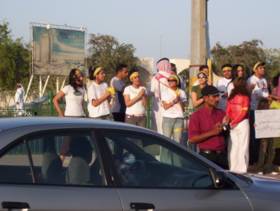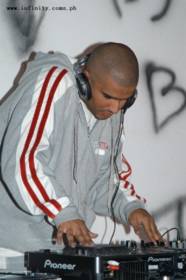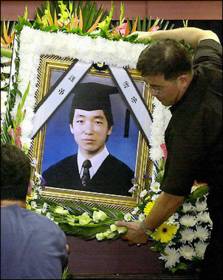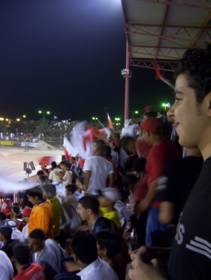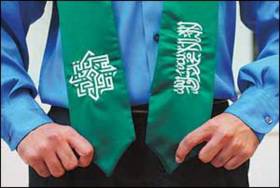
If any of you've been following the
Muslim graduation stoles controversy at UC Irvine, here is an interesting commentary from
alt.muslim:
Warping The Truth: The Panic Over Muslim Graduation Stoles
You'd think that after years of all-Islam, all-the-time news reporting, of people studying Islam both formally and informally, and so many self-styled "Islam experts" plying the radio and TV talk shows, that critics of Islam would know at least the basics about the religion. This week's "controversy" over Muslim graduation stoles at the University of California, Irvine reveals how fear can warp the truth, even when people who make a living watching Muslims are involved. Seems that some Jewish students were upset about the green, Arabic-covered stoles, finding too much of a similarity between them and green headbands Hamas militants use. It's understandable, I suppose, since the students in question can't read Arabic and their only exposure to Arabic written on green cloth (the shahada, or Muslim declaration of faith, was printed on one side of the stole; the other said "Oh, God, increase my knowledge") was what they see on their TV screens. (Muslim students could have made the same complaint about stars of David, which are plastered on Israeli army tanks & warplanes, but they're smart enough to make the distinction between politics and religion.) What is baffling, though, is that nearly every news outlet said that the word "shahada" was on the stoles (it wasn't - the phrase "There is no god but Allah, and Muhammad is His messenger" that makes up the shahada was) and that the American Jewish Congress said that the word "shahada" that they think is on the stole translated to "suicide bomber". The AJC also called the shahada an "expression of hate" that was a "demonstration in favor of terrorists". Thankfully, UC Irvine officials backed the 20 Muslim students who wore the stoles without incident at their commencement ceremonies, and plan to in the future. "Students wore it at last year's graduation, too," said UC Irvine Muslim Student Union president Osman Umarji. "No one even noticed it." Well, they have now - and they want all Muslims to drop the most basic declaration of their faith because some terrorists have been filmed abusing it.
I have to agree that this incident really shows how little understanding there is of Islam and Muslims among most Americans. Okay, we can't really expect all Americans to know what the
shahada is, but certainly those media institutions and scholars who have been reporting about Muslims for so long should have some idea. It is amazing how many people there are in America who think they know Islam and speak with authority about it without ever having lived in the Muslim world for any significant amount of time. If you listen to what these self-styled scholars have to say it becomes obvious that they really do not understand the differences between
Islam,
Muslims,
Islamism or
Islamic fundamentalism.
And their tendency to confuse the terms
Islam and
Muslim goes deeper than just semantics. They seem to believe that Muslims are mere Islamic robots. Thus they think that by reading all of the Islamic scriptures (Quran, Hadith, etc.) they will be able to understand Muslims; as though Muslims have no cares other than abiding by the scriptures; as though Islam is nothing more than a collection of words written on parchment 1400 years ago.
The first thing that needs to be acknowledged is that being 'Muslim' is not the only identity carried by Muslims. Muslims are not only Muslims, but are also parents, siblings, children, employees, bosses, friends, politicians, citizens, and above all, human beings. They have interests that go beyond their Muslims identities, and may therefore be driven to do things for reasons other than Islam. Although Osama bin Laden claims to be doing everything for the sake of Allah, let's be serious. I'm sure he has his personal interests to care about, his family, his friends, his money, his comfort. And being in the position that he is, he also has to be somewhat of a politician, compromising his Islamic values for other reasons. This is why we can't try to understand his actions just by reading the Quran and the Prophetic traditions. Nor can we undersand his actions just by listening to his rhetoric. We have to understand who he is, his culture, his interests, his history. These are the things that make up a human being; not merely words written on parchment centuries ago.
And this applies to all Muslims in general... not just the terrorist kind. To be able to understand Muslims we have to learn about their culture (not just "Islamic culture" if such a thing exists). We have to understand how Muslims interpret symbols, icons and rhetoric that are used. In the case of the
shahada we need to know the significance of this phrase to Muslims, and not just what it means for
Hamas. Only then can we begin to make a judgement on whether its use constitutes malicious intent or not.
The second thing that must be understood is that Islam is not just a bunch of texts. As I've said before, we can't reduce it down to just a collection of words written on parchment 1400 years ago. May of these American self-styled scholars of Islam will claim that they "know Islam even better than many Muslims" because they can quote verses from the Quran and from Tabari and Ishaq, which many Muslims may not have even heard of. But we must recognize that Islam is a living religion; it is made up of human beings, not texts. There is very much an oral tradition among Muslims with information being passed on from generation to generation, from master to disciple, from parent to child, from friend to friend. Sometimes this information is not passed down through words, but through experiences, and without either of the parties even being aware of it, it enters their psyche. It is these things which determine, among other things, how the words of the texts are interpreted in to everyday life; for words are merely words and can be interpreted in any way one sees fit. Learning just the texts alone is not nearly enough to be able to understand what Islam is about.
To really understand what Muslims are, there is NO substitute for living among Muslims, observing them and interacting with them. Learning their history, their culture, their personal lives, their philosophies. Understanding what it is that makes them tick, and how they interpret social action. Judging for yourself whether these people are of the human species that the rest of us belong to, or whether they are a different beast altogether. But until they are able to do this, these so-called American scholars who have never lived among Muslims should speak with humility. By all means they should read whatever they can and make known their opinions. But they should be aware (and also make their audience aware) of the fact that their source of knowledge is limited to a few years of learning the texts, which is not nearly enough to understand how the Muslim mind thinks. And they should also refrain from casting their image of a Muslim upon all Muslims. Very often I read a pseudo-scholar saying something like
"those Muslims aren't abiding by such and such verse of the Quran, therefore they are not behaving like real Muslims." The implication of such a statement is that their (i.e. the pseudo-scholar's) interpretation of that verse, and their interpretation of what a
real Muslim is is the
only interpretation.
My problem here is not that Americans do not know enough about Muslims, but that today many Americans speak with an authority of the subject which is not deserved. Prior to 9/11 when I would get in to a discussion with an American about Islam they would humbly admit that they do not know enough to be able to pass judgement, and would kindly ask me if I might share whatever I may know. In the aftermath of the 9/11 disaster, it seems that many Americans, understandably, feel the need to learn about Islam as soon as possible whatever source is available. All of a sudden I'm finding that more and more people who knew nothing about Muslims just three years ago passing all sorts of judgements in the media, without making it explicitly known their level of interaction with Muslims themselves.
Certainly, the Muslim world has suffered from the same problem for much longer. It is all too common to hear Muslim politicians, religious leaders and pseudo-scholars passing judgements about America based on CNN, Hollywood, and internet rumours, without ever having met an American. For example, when GW Bush used the word "crusade" in describing the War on Terrorism, all of the Muslim world jumped on it, claiming it as evidence that the war was fuelled by religion. But of course, anyone who really understands the English language in its modern-day context will know that the word
crusade does not necessarily carry the same religious connotations it did in the past. While Muslims, more than anyone, need to overcome this "know-it-all" attitude, the reason I am so disturbed about it appearing in the American media is because I never though it would reach such levels. When reading some American news sources I am reminded of exactly the same style of arguments that I'm so familiar with here in the Muslim world, where people who have no idea of what they're talking about are (unknowingly) fooling themselves and others with their false authority.
Just an example of the extent of this is the whole graduation stole issue that I started off this post about. Asides from the fact that none of the media sources have any idea of what the
"shahada" is, if you read the
Jewsweek article about the controversy, they state:
According to a letter sent by MSU board member Jazakhallah Kair to all graduating Muslims...
Haha, really this is too much. If you're an Arabic speaker reading this, then I'm sure you're rolling on the floor in laughter. Because
"Jazakallah Khair" is not a very common Muslim name. It is an Arabic phrase meaning "May God reward you well" which is very commonly used by Muslims. What must have happened is that the MSU board member who actually sent the original e-mail must have used this phrase while "signing out" (which is very common). The writer of the Jewsweek article probably got a hold of the e-mail somehow and just assumed that the MSU member's name is
"Jazakhallah Kair". Hahaha. Although it is hilarious, it does illustrate the sad state of affairs, that there are so many people who are writing with authority, but so few of them have a real grasp of the subject.







